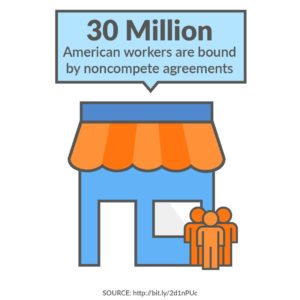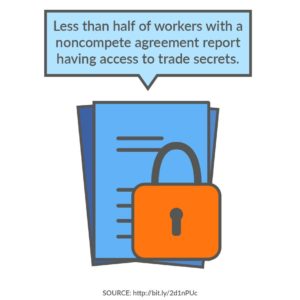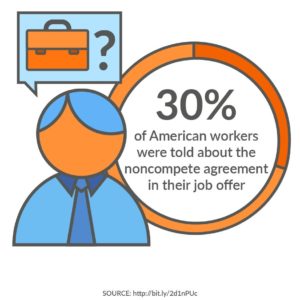You want to protect your business from any potential harm. You don’t want your employees to walk off with your business’s secrets and share them with other businesses.
A noncompete agreement might be useful for your business. In fact, 18% of American workers (nearly 30 million people) are bound by noncompete agreements. And, 37% of workers have had a noncompete at some point in their careers.
So, what is a noncompete agreement, and should your business make employees sign one?
What is a noncompete agreement?
A noncompete agreement (sometimes known as a covenant not to compete or CNC) is a type of confidentiality agreement. A noncompete agreement prevents your employees from becoming your competition in the future. When an employee signs a noncompete clause, the employee generally cannot work for your competitors nor start a business to become your competitor.
How long can a noncompete agreement last?
Noncompete agreements only last for a designated period of time. For example, you might ask employees to sign an agreement that says they cannot work for a competitor for two years after termination.
Noncompete clause also typically apply to a specific geographic area. For example, if you do all your business within a particular city, you might write the noncompete to apply to that city.
What goes in a noncompete agreement?
Several items go in a typical noncompete clause:
- The date the agreement becomes effective
- The parties the agreement applies to
- Reason for the noncompete
- Things the employee is not allowed to do
- The length of the agreement
- The geographic region the agreement applies to
- Signatures of all parties involved
If you decided to make a noncompete agreement, you should consult a lawyer. Make sure the agreement is enforceable and meets your state’s laws.
Should I have a noncompete agreement?
You might want to create a noncompete agreement if you don’t want employees to take their knowledge of your business to a competitor. Noncompete agreements are good for businesses that have trade secrets, advanced technical information, or business practices that you want to protect.
A noncompete clause might help you find workers who are more committed to your business. Potential employees who aren’t planning to job-hop might be more likely to take a job with a noncompete agreement.
Reasons why you might not want a noncompete agreement
A noncompete agreement might not be right for all businesses or all employees.
If a noncompete agreement binds an employee, the employee might have difficulty finding another job if they leave your company. Future employment might be especially difficult for employees with specialized skills who have to leave their occupation completely to find a job.
While a noncompete clause might help protect trade secrets, less than half of workers with a noncompete agreement report having access to trade secrets. If an employee doesn’t have any trade secrets, the agreement might be unnecessary.
Noncompete laws by state
Not all states enforce noncompete clauses or have special rules. For example, California does not allow noncompete agreements. Check your state noncompete laws to learn if there are special restrictions you must follow.
A word of caution
One survey showed that barely 30% of workers were told about the noncompete in their job offer. And about half the time, the employer didn’t present the noncompete until the first day of work or later.
Tell potential employees about the noncompete clause. Knowledge of the clause will help the candidate decide if they do want to work for you.
If you ask your employees to sign noncompete agreements, many might not realize what they are signing and its implications. An employee’s lack of knowledge might cause problems later on.
Be transparent with your employees. Make sure the agreement is clearly written, and make sure employees know what it means.
This is not intended as legal advice; for more information, please click here.
These views are made solely by the author.




